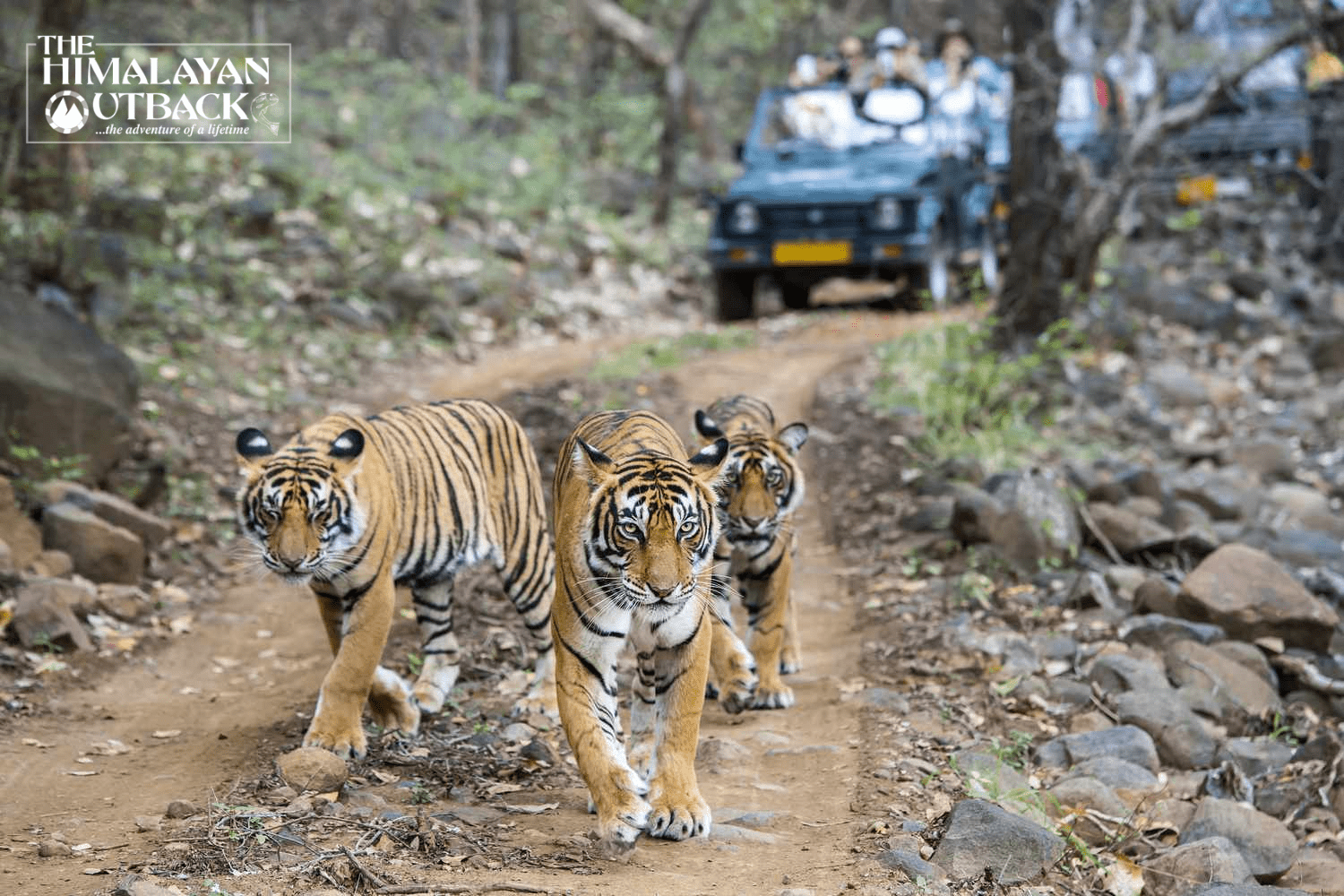With its own quality and appeal, Ranthambore National Park has a prominent position in India’s tourist business. However, while the Ranthambore National Park National Park is not the largest in India, it is unquestionably the most well-known. The Ranthambore National Park forest locates near the Aravali hills and the Vindhya plains It has an area of 1334 square kilometres, with 392 square kilometres designated as a national park. The Ranthambore National Park tiger reserve is highly regarded for its natural habitat to a substantial number of Royal Bengal tigers. And it is very popular among wildlife enthusiasts for its diurnal tigers. It means tourists may easily sight a tiger during their day safari visit.
The Himalayan Outback has brought to you all that you need to know about the Ranthambore National Park. Have a read.
The Ranthambore National Park Safari
Ranthambore National Park is a renowned tourist location for Ranthambore National Park safaris. Numerous well-known tigers are present in this forest park. Due to this, hundreds of tiger enthusiasts from all over the globe travel here on a daily basis during the safari season. Among several great tigers, the tigress Machli was the world’s most celebrated tiger.
She died in August 2016, but she left behind numerous legends from her youth. Her bravery and tenacity have inspired several nature documentaries, films, and television series. Seeing these terrifying wild predators in their native untamed surroundings from a safe distance is an adrenaline-pumping adventure. This would definitely be an adventure to remember for the rest of your life.

Main Attractions at Ranthambore National Park
The Ranthambhore National Park is famous not just for its tiger reserve, but also for its heritage monuments. These include the majestic Ranthambore Fort, Jogi Mahal, Ancient temple, and Rajbagh ruins, all of which are reminders of the splendour and grandeur of Ranthambore’s rulers. Many gorgeous lakes, such as Padam Talao, Malik Talao, Raj Bagh Talao, and others, enhance the beauty of this forest, which includes deciduous forest, tiny hills, valleys, and lush foliage.
The park is bounded on two sides by the Chambal and Banas rivers, which add to the untamed atmosphere of the Ranthambhore forest. The entire experience of viewing animals and birds, and enchanting vegetation will captivate your thoughts. And you will thank yourself for embarking on this wildlife excursion.
History
The Ranthambore forest, named after the famed Ranthambore Fort, which is located in the centre of the jungle, bears evidence to the imperial era’s lengthy and rich history. During the royal era, before India’s independence, there was extensive forest cover that spanned practically the whole Indian subcontinent. However, as the population increased and industrial development began, exploitation of forests began to meet the needs of the people, resulting in the tremendous destruction of the country’s green cover.
The country’s dwindling forest cover and wildlife caused the government to pay attention to this growing problem, and as a result, numerous measures were implemented to safeguard the surviving forests and the wild residents of the woods by designating them as reserve forests and national parks.
The Project Tiger
The Rajasthan Forest Act went into effect in 1953 to offer some legal protection for Rajasthan’s forests. Though it was not enough to completely protect the forest cover, it did slow down the exploitation. The whole forest cover around Ranthambore was named the Sawai Madhopur Sanctuary in 1955, making any economic activity in the park illegal.
However, the number of tigers in the forests was decreasing, and this wild predator was on the verge of extinction in the country. As a result, a tiger conservation programme has been established. The Indian government launched Project Tiger in 1973. The Sawai Madhopur Sanctuary, covering an area of 60 square miles, was included in the Project Tiger Scheme and designated as a Tiger reserve area.
Ranthambore Fort
The Ranthambore Fort, one of India’s ancient forts, has been designated as a UNESCO World Heritage Site owing to its historical significance. The fort is located within the Ranthambore National Park, 13 kilometres from the Sawai Madhopur railway station. This ancient fort is reported to have been erected around 944 AD and has seen Rajasthan’s lengthy history.
The Ranthambore Fort was the crucial fort and therefore seized by numerous kings. It was the embodiment of heroism and pride of the Rajput rulers of the various Kingdoms. At the time of India’s independence and the end of the imperial era, the fort was under the control of the Maharaja of Jaipur, and the Ranthambore forest was the exclusive hunting field for the Royals of Jaipur Kingdom.
Trinetra Ganesha Temple
The Ganesha temple, located at the entrance of the Fort, has been popular among Lord Ganesha followers since ancient times. It is the only temple of Trinetra Ganesha in the country. The statue of Lord Ganesha with his wives Riddhi and Siddhi makes it an unique Ganesha temple with his entire family. There are numerous tales related with the temple’s creation, making it a distinctive and popular holy destination for Hindu believers.
The temple is also known for its unusual history of receiving postal invitation letters submitted by worshippers in order to invite Lord Ganesha to any momentous occasion in their family. Every day, the temple gets hundreds of invitation letters, and each one is read out by the priest in front of the Idol.
Bakula Region
The Bakula area is the ultimate gorgeous scenery surrounded with lush foliage and water bodies, and is considered the finest place for tiger visibility in the Ranthambore jungle. The densely wooded region of Bakula, together with numerous ponds and water holes, lends a distinct wilderness feel to the Ranthambore forest. Because of the deep forest, water availability, and distant location, there is an abundance of species in the region, making it a nature lover’s delight. Tiger sightings are rather common in this area, and travellers are frequently treated to the sight of a relaxed tiger, particularly a tigress reclining or wandering with her cubs.
Kachida Valley
The Kachida Valley, located on the outskirts of the tiger reserve zone, is a must-see for wildlife enthusiasts due to the quantity of panthers, bears, and other wild species, as well as a distinct fascinating environment with rocky outcrops, tiny valleys, low hills, ravines, and water bodies. The abundant flora and calm environs make this spot a genuine wilderness apart from any human activity. Only during the Jeep Safari Ranthambore can you discover the solitude and splendour of the Kachida Valley.
The Jogi Mahal
The Jogi Mahal, which is now a tourist attraction within the Ranthambore forest, was originally the resting place for the Royals of Jaipur Kingdom on their hunting expeditions to Ranthambore. The modest palace, attractively hidden in the Ranthambore forest on the bank of the famed Padam Lake, is an outstanding sight for monument enthusiasts. The great banyan tree near the palace is the second biggest banyan tree in the country and a tourist attraction.
Conclusion
So the above was all that you need to know about the Ranthambore National Park. We would be glad if you let us know how much you liked this information in the comments section. Also, plan your adventurous Tiger Safari at Ranthambore National Park with The Himalayan Outback. And you will definitely experience an adventure of a lifetime!






